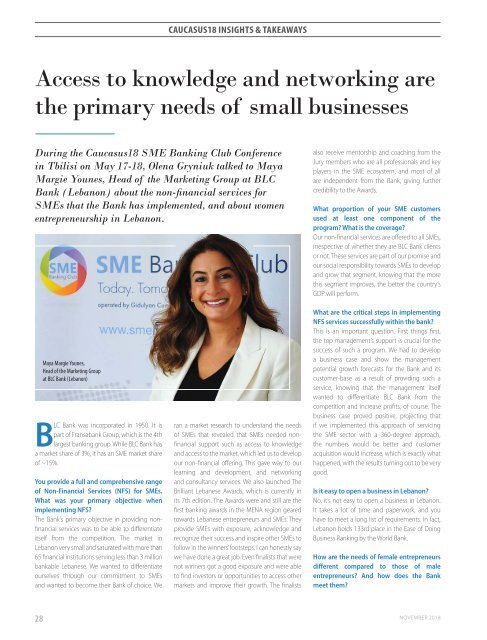SBM magazine / 11-2018
business / banking / SME Banking Club
business / banking / SME Banking Club
Create successful ePaper yourself
Turn your PDF publications into a flip-book with our unique Google optimized e-Paper software.
CAUCASUS18 INSIGHTS & TAKEAWAYS<br />
Access to knowledge and networking are<br />
the primary needs of small businesses<br />
During the Caucasus18 SME Banking Club Conference<br />
in Tbilisi on May 17-18, Olena Gryniuk talked to Maya<br />
Margie Younes, Head of the Marketing Group at BLC<br />
Bank (Lebanon) about the non-financial services for<br />
SMEs that the Bank has implemented, and about women<br />
entrepreneurship in Lebanon.<br />
also receive mentorship and coaching from the<br />
Jury members who are all professionals and key<br />
players in the SME ecosystem, and most of all<br />
are independent from the Bank, giving further<br />
credibility to the Awards.<br />
What proportion of your SME customers<br />
used at least one component of the<br />
program? What is the coverage?<br />
Our non-financial services are offered to all SMEs,<br />
irrespective of whether they are BLC Bank clients<br />
or not. These services are part of our promise and<br />
our social responsibility towards SMEs to develop<br />
and grow that segment, knowing that the more<br />
this segment improves, the better the country’s<br />
GDP will perform.<br />
Maya Margie Younes,<br />
Head of the Marketing Group<br />
at BLC Bank (Lebanon)<br />
BLC Bank was incorporated in 1950. It is<br />
part of Fransabank Group, which is the 4th<br />
largest banking group. While BLC Bank has<br />
a market share of 3%, it has an SME market share<br />
of ~15%.<br />
You provide a full and comprehensive range<br />
of Non-Financial Services (NFS) for SMEs.<br />
What was your primary objective when<br />
implementing NFS?<br />
The Bank’s primary objective in providing nonfinancial<br />
services was to be able to differentiate<br />
itself from the competition. The market in<br />
Lebanon very small and saturated with more than<br />
65 financial institutions serving less than 3 million<br />
bankable Lebanese. We wanted to differentiate<br />
ourselves through our commitment to SMEs<br />
and wanted to become their Bank of choice. We<br />
ran a market research to understand the needs<br />
of SMEs that revealed that SMEs needed nonfinancial<br />
support such as access to knowledge<br />
and access to the market, which led us to develop<br />
our non-financial offering. This gave way to our<br />
learning and development, and networking<br />
and consultancy services. We also launched The<br />
Brilliant Lebanese Awards, which is currently in<br />
its 7th edition. The Awards were and still are the<br />
first banking awards in the MENA region geared<br />
towards Lebanese entrepreneurs and SMEs. They<br />
provide SMEs with exposure, acknowledge and<br />
recognize their success and inspire other SMEs to<br />
follow in the winners’ footsteps. I can honestly say<br />
we have done a great job. Even finalists that were<br />
not winners got a good exposure and were able<br />
to find investors or opportunities to access other<br />
markets and improve their growth. The finalists<br />
What are the critical steps in implementing<br />
NFS services successfully within the bank?<br />
This is an important question. First things first,<br />
the top management’s support is crucial for the<br />
success of such a program. We had to develop<br />
a business case and show the management<br />
potential growth forecasts for the Bank and its<br />
customer-base as a result of providing such a<br />
service, knowing that the management itself<br />
wanted to differentiate BLC Bank from the<br />
competition and increase profits, of course. The<br />
business case proved positive, projecting that<br />
if we implemented this approach of servicing<br />
the SME sector with a 360-degree approach,<br />
the numbers would be better and customer<br />
acquisition would increase, which is exactly what<br />
happened, with the results turning out to be very<br />
good.<br />
Is it easy to open a business in Lebanon?<br />
No, it’s not easy to open a business in Lebanon.<br />
It takes a lot of time and paperwork, and you<br />
have to meet a long list of requirements. In fact,<br />
Lebanon holds 133rd place in the Ease of Doing<br />
Business Ranking by the World Bank.<br />
How are the needs of female entrepreneurs<br />
different compared to those of male<br />
entrepreneurs? And how does the Bank<br />
meet them?<br />
28<br />
NOVEMBER <strong>2018</strong>

















